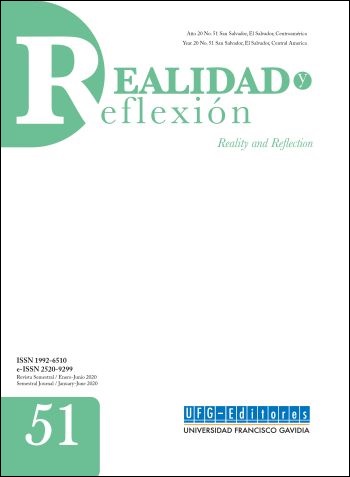ICT as a cultural link between migrant Salvadorans and their country
DOI:
https://doi.org/10.5377/ryr.v51i0.9843Keywords:
migrant, El Salvador, ICT, national identity, culture, hybridizationAbstract
Technologies are changing the way migrants relate to their countries. The Salvadoran Diaspora, which amounts to 2.1 million just in the United States, has used them as a way of being in touch with their families. However, web pages of radio and television channels, streaming and social networks have led to cultural hybridization processes that make the relationship with their country of origin and with the one they are living in complex. From a mixed methodology (qualitative and quantitative) that involved the use of a survey and in-depth interviews, the research seeks to understand how these processes of identity and transnationalization of Salvadorans residing in the United States are reconfigured from their consumption of digital media. The results suggest that ICTs allow migrants to expand access to Salvadoran cultural products, especially news and music, which has made them important actors in the processes of consumption, appropriation and even creation of these kind of products.
Downloads
695
Downloads
Published
How to Cite
Issue
Section
License
© Universidad Francisco Gavidia
Instituto de Ciencia, Tecnología e Innovación (ICTI)
Reality and Reflection
The content and opinions expressed in the publication are the responsibility of the authors of the published articles. The authors assign the publishing and publishing rights, in printed and digital version, to the Universidad Francisco Gavidia.
Proof of originality and assignment of publication rights
The authors must sign a certificate in which they indicate that the text presented for publication is original, unpublished and that it has not been sent for review in another academic publication; In turn, the authors assign the rights of publication and publication to Francisco Gavidia University. The format of this record will be sent through the emails: editores@ufg.edu.sv and jlozano@ufg.edu.sv
The journal Reality and Reflection is housed in the institutional dissemination platforms (web page and in the repository), as well as in databases and other pages of scientific dissemination. The publications of the Francisco Gavidia University are subject to the Salvadoran copyright law, contemplated in the Intellectual Property Law https://www.asamblea.gob.sv/
The content of the work is the sole responsibility of the author, therefore, if for any reason or reason, direct or indirect, the Editor is obliged to pay any compensation to a third party derived from the work of the author, whether it is established in a transaction, agreement or final or enforceable judicial sentence, the Editor may repeat against the Author for the total amount of compensation, plus adjustments, interests and costs that correspond.
It will be the obligation of the UFG to grant five copies of the publication which will be delivered at the UFG Editores headquarters in San Salvador.

